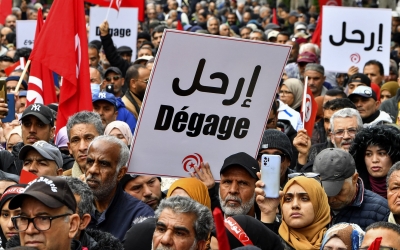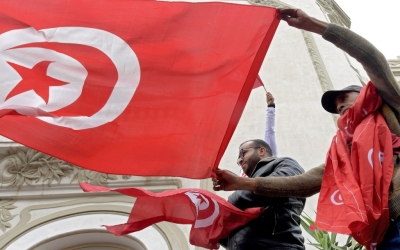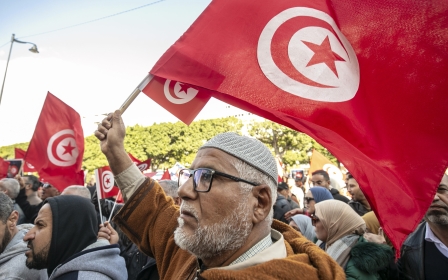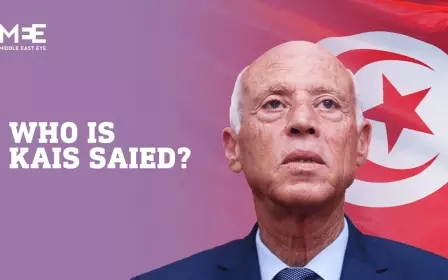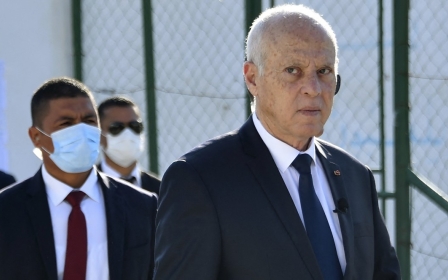Tunisia: If democrats unite, they can still save the country
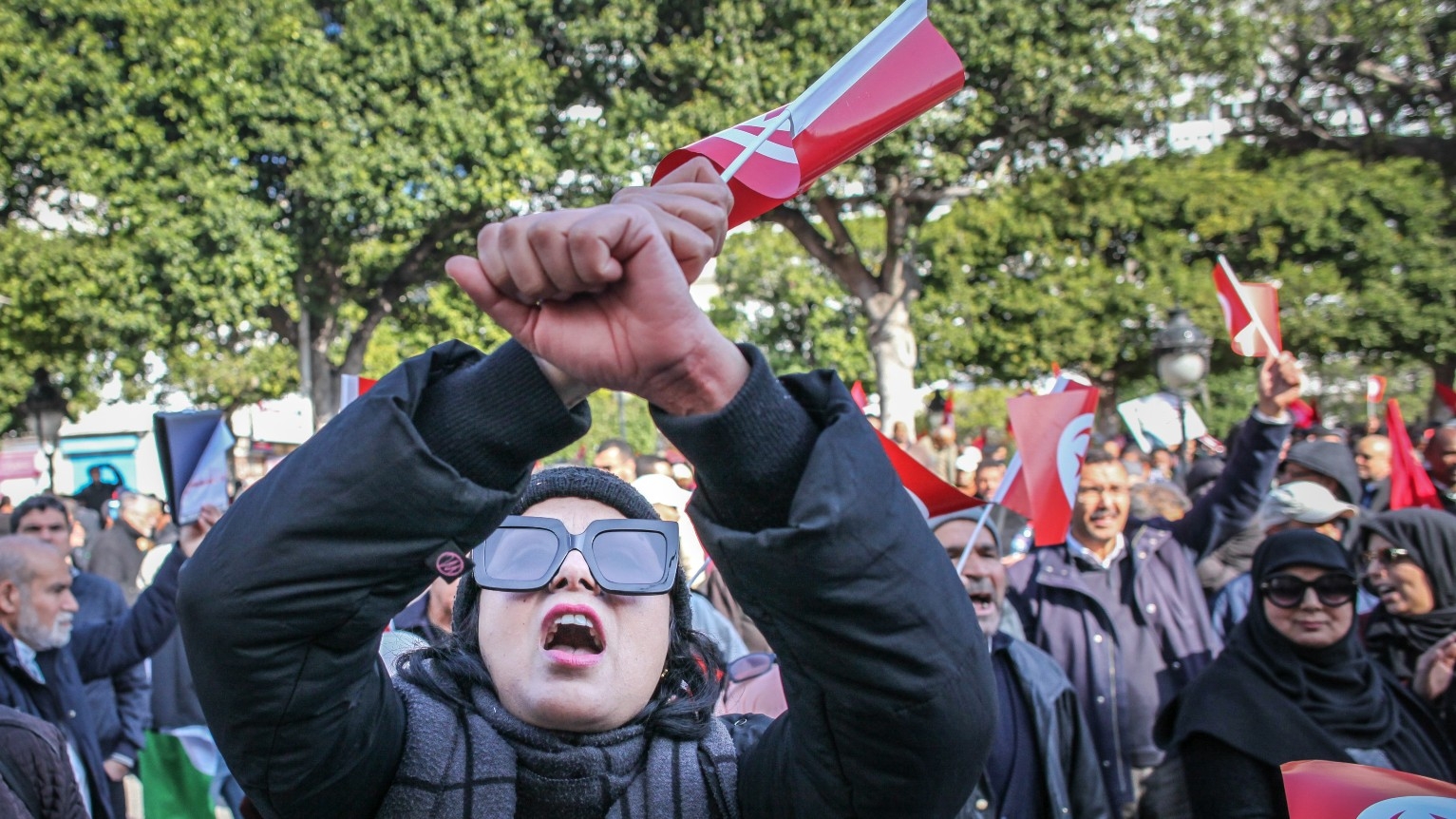
How strange things are a decade on from the crushing of the Arab Spring uprisings.
The countries that crushed it are busy making peace with the countries that supported it. Saudi Arabia, the chief bankroller of the military coup in Egypt in 2013, is at loggerheads with Cairo and the two countries are engaging in a full blown media war.
Tunisia has been turned upside down. Everything the small country represented a decade ago has been overturned today
The United Arab Emirates has unblocked Al Jazeera and Qatar’s other state-funded websites. Al Jazeera is responding by making its content Abu Dhabi and Dubai-friendly. Turkey is getting up to $10bn in Emirati investment and $5bn from the Saudis.
But strangest of all, Tunisia, which a decade ago served not only as the spark for a continental revolution, but also as the beacon of a peaceful transition from dictatorship to democracy, is run by a tinpot dictator. By tinpot, I mean someone who makes former dictators like Habib Bourguiba and Zine el-Abidine Ben Ali measured in comparison.
Tunisia has been turned upside down. Everything the small country represented a decade ago has been overturned today. Then, the boast of its army was that it did not get involved in politics or business.
New MEE newsletter: Jerusalem Dispatch
Sign up to get the latest insights and analysis on Israel-Palestine, alongside Turkey Unpacked and other MEE newsletters
Now the army has two ministers from its ranks in the government, in health and agriculture, and is gaining access to vast swathes of land.
If Turki al-Hamad, a Saudi writer close to Crown Prince Mohammed bin Salman, identified the Egyptian army’s dominance over the state economy as one of the factors behind the country's economic collapse, the generals in Tunisia are following in their Egyptian brothers' footsteps like lemmings heading for the cliff edge.
Limitless powers, zero legitimacy
A decade ago, Tunisia had a coalition government and political parties that ceded power voluntarily.
There was a constitution that ensured a basic separation of powers between the government, parliament and the courts. Prime ministers had powers which presidents did not have. There were regular elections with turnouts that validated the result.
Today, Tunisia is run by one man, Kais Saied, a president with limitless power and zero legitimacy.
Officially an 11 percent turnout was recorded in the parliamentary run-offs in January. In reality, the turnout was probably not that much different from the 8.8 percent recorded in December’s first round, possibly even less. Either way, these figures represent a nationwide boycott by the people who gave him a landslide victory in October 2019.
A Tunisian parliament conceived as an institution that recognises the absolute authority of the head of state, with no control over the executive branch, was born dead.
It is all too clear why. Saied’s project has failed. There are shortages of basics like coffee, sugar, milk on the shelves. There are frequent delays to public sector salaries as the state is basically bankrupt. Negotiations on the IMF’s crucial $1.9bn bailout have stalled.
Saied has been forced onto the back foot. He says the disorder is all down to corruption. He says everyone else is to blame.
As Ahmed Najib Chebbi, head of the National Salvation Front, told MEE: "Mr Said's authority is based on conspiracy theory. 'There are demons', 'there are conspirators', 'there are traitors', 'There are monopolists targeting the country'."
Tunisia’s death spiral has undoubtedly been helped by an opposition unable to unite. Ennahda, Tunisia’s largest party, was not supported by secular and liberal parties in the initial demonstrations outside the locked gates of their parliament. Even today, the National Salvation Front and the unions are still running separate campaigns and separate "national dialogues".
But they are being pushed into each other’s arms by a president who is responding to each challenge with a wave of arrests.
The 'coffee conspiracy'
The only defining feature of the people locked up by Saied is that they come from right across the political spectrum.
To defend a client in court is to risk arrest yourself. For activists like Chaima Issa or Jaouhar Ben Mbarek, their crime was setting up a meeting with the US embassy. Issa has been charged with spreading false information. Others have been accused of conspiring to create shortages of subsidised food.
The only defining feature of the people locked up by Saied is that they come from right across the political spectrum
Khayam Turki, a social democrat facilitating discussion between secular and Islamist orientated opponents of Saied, had been working day and night to bridge the gaps among the opponents until his arrest last month.
It's now known with the dark humour as the "coffee conspiracy". Everyone who came to his house for coffee has been arrested. Turki, who has dual Tunisian and Spanish citizenship, is well connected internationally. One of the charges he faces is conspiracy.
It must be the first time in Tunisia that the act of conspiracy involves talking to the US charge d’affairs, where the number plates of her security guards are photographed and used in evidence.
Pragmatists like Chebbi are however clear about the direction of travel. "The social movement should realise that it is in front of a wall. Therefore, it is necessary to make authority accept dialogue and make it unite political and trade union forces to demand a national dialogue that will open the way for Tunisia's exit from the crisis.
"We hope that the labour union will put its movements on a national horizon rather than a purely sectoral horizon because the situation requires this vision."
As Saied’s dictatorship deepens, the fractured strands of the opposition are getting closer, if only by one inch at a time. Moderation, compromise, the ability to bridge deep social and political divides - the very qualities that distinguished Tunisia’s experiment with democracy - are toxic for Saied’s presidency.
And so his next target was Africa, the very continent on which Tunisia’s economy, history and culture is based.
A 'pogrom' against migrants
On 21 February, Saied unleashed a verbal torrent of abuse against undocumented Black African migrants.
"There is a criminal plan to change the composition of the demographic landscape in Tunisia and some individuals have received large sums of money to give residence to sub-Saharan migrants," said Saied in an official despatch from the presidency. "Hordes of illegal immigrants from sub-Saharan Africa are still arriving, with all the violence, crime, and unacceptable practices that entails," he told his national security council.
The assault is not just verbal or rhetorical. African migrants have been evicted from their houses, attacked with machetes, and subject to beatings and continual police harassment.
The only question now is whether Tunisians will allow themselves to become slaves, once again, to a despot sitting in a palace in Carthage
Quite apart from the human rights of migrants, Saied’s "pogrom" against migrants also endangers Tunisians who form part of the human wave across the Mediterranean.
Tunisian migration has increased under this president. The Tunisian Forum for Economic and Social Rights (FTDES) reported that last year 443 people died or went missing while trying to cross illegally to Italy from Tunisia. Another 10,139 Tunisian nationals reportedly reached the country, among them 2,102 children and 498 women.
Over a million Tunisians live in France, 300,000 of whom were not born there. Another 300,000 are in Italy. What protection do they get from a president who calls migrants a criminal conspiracy to change the demographics of their host country?
Kais Saied has so far stopped short of putting his main political foe, the man who symbolised post-authoritarian Tunisia, Rached Ghannouchi, behind bars, although the courts have subjected the 82-year-old veteran politician to around 100 hours of interrogation, with nine summons for six equally suspicious cases.
Quite why Ghannouchi is not in prison is a mystery. Could it be that when that happens Saied has exhausted his utility to his backers? Or that he fears that this man’s arrest would be a red line, the crossing of which would guarantee mass unrest?
But there is one thought that dominates the thinking of all of Saied’s many enemies - this situation can not last, either economically, politically or socially.
All is not lost
Former Tunisian presidents Bourguiba and Ben Ali did not exclude everyone at once.
To crack down on the unions, they would bring others on side. To crack down on the Muslim Brotherhood, they would carve a space for secular liberal elites. And both of them benefited from the international boycott of Muammar Gaddafi’s Libya.
None of this applies to Saied. The Gulf states no longer bankroll bankrupt economies in the Maghreb.
There is the Italy of the far right Giorgia Meloni and the continuing interest of France’s security services in supporting dictatorships in North Africa, but these are not life savers, and the bigger neighbours closer to home, like Algeria, are unhappy with the turn of events in Tunisia.
After the debacle of Libya, Russian President Vladimir Putin - and the Wagner Group - have enough on their hands with invading Ukraine. There is no one obvious to which Saied can run for help. On the other hand, there continues to be a complete lack of engagement by the US and the EU, who are content, once again and just as disastrously, to "lead from behind".
Tunisia is too small a country to matter.
Instead of being a beacon of peaceful change in the Middle East, Tunisia has become a magnet for the far right. Eric Zemmour, the French far right leader, applauded Saied’s declaration on migrants: "Tunisia wants to take urgent action to protect its people. What are we waiting for to fight this Great Replacement?"
Saied’s presidency is a slow-motion car crash. Ten years on, democracy in Tunisia is truly in peril.
The only question now is whether Tunisians will allow themselves to become slaves, once again, to a despot sitting in a palace in Carthage. If they unite, all is not lost. But it remains a big if.
The views expressed in this article belong to the author and do not necessarily reflect the editorial policy of Middle East Eye.
This article is available in French on Middle East Eye French edition.
Middle East Eye delivers independent and unrivalled coverage and analysis of the Middle East, North Africa and beyond. To learn more about republishing this content and the associated fees, please fill out this form. More about MEE can be found here.



